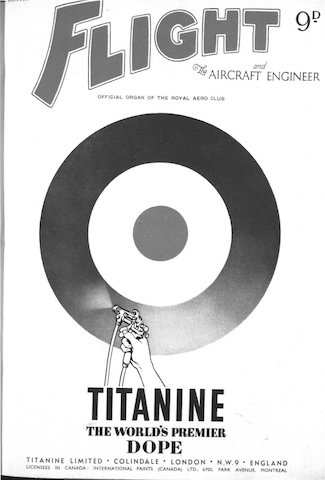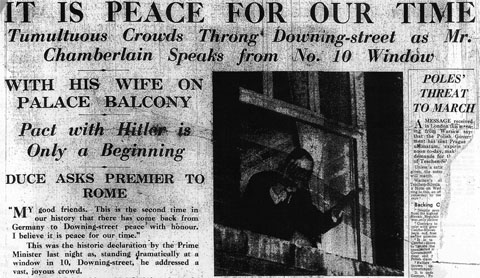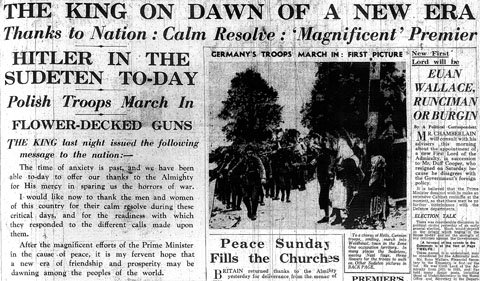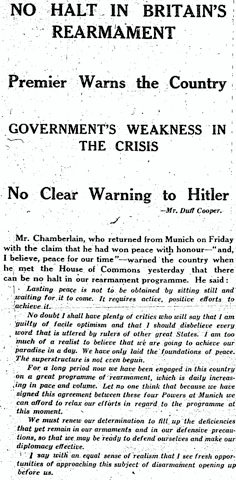
The main headlines in today's Daily Mail report (p. 11) on a battle raging in Palestine between 'Arab terrorists' and British aircraft and troops. Reinforcements are en route, and the High Commissioner has flown back to London for consultations. Hang on: this isn't about Czechoslovakia at all! For the first time since (at least) 29 August, one of the three major papers in my sample has decided to lead with something other than the Sudeten crisis or a related issue. It's starting to lose its hold on the public's attention.
It's still the major story in the other newspapers, however. The Manchester Guardian leads (p. 9) with Churchill's strong attack on the Munich agreement in the House of Commons, yesterday. He spoke of 'The sense of our country falling into the power orbit and influence of Nazi Germany':
The utmost the Prime Minister has been able to secure has been to secure that the German dictator instead of snatching his victuals from the table has been content to have them served to him course by course.
(Though I think Lady Gladstone has a more striking soundbite: in speaking to a meeting of women Liberals in Bury she called the Munich agreement 'vivisection without anaesthetic'. Manchester Guardian, p. 10.) He has called for a secret session of Parliament on defence. In Paris, Daladier has also been having a hot time of it, but he has finally managed to get Parliament to agree to give him plenary powers in response to the recent crisis -- I'm not sure exactly what these entail, but there's talk of making the working week longer (to increase armaments production?) and revaluing the franc. The debate was contentious, and broke the Popular Front. Can France rely on having any allies? If not, it will need 'three more Maginot Lines (wherever the money may come from) and buy three thousand bombers' (Manchester Guardian, p. 12). Nobody knows what's going to happen. The leading article in the Manchester Guardian today (p. 8) mulls over the strategic balance: Britain and France need to improve their defences greatly. A German official has boasted that the Luftwaffe has as many aircraft as both of them plus Czechoslovakia, and if Italy fights alongside then the dictatorships will certainly have a preponderance. The 'reactionary demand for military conscription' must be resisted, but a 'national register' of some form is a good idea, and:
It will also necessarily involve "industrial mobilisation" on a large scale and the organisation of all that is covered by the "home front". These things are repugnant to most of us, but if they can be approached in the spirit of common concern, if a democratic basis is preserved, they can be made to work even under a Government whose policy we do not trust.
In Czechoslovakia, President Beneš has resigned. Presumably this is in response to the pressure from Germany mentioned in yesterday's papers. But in his own words, 'In order not to jeopardize the life of our State in the new circumstances I think that as President I should no longer stand in the way'. That is, because he himself is an irritant to good relations with Germany he has stepped down (The Times, p. 12). He might get a consolation prize though -- Whately Carrington has written to the Manchester Guardian to endorse a previous suggestion that Beneš be awarded the Nobel Peace Prize, in 'appreciation of the unexampled act of sacrifice made by his great people in the cause of peace' (p. 18). Hitler, however, speaking at the Berlin Sports Palace, has thanked Mussolini (by name) and Chamberlain and Daladier for their assistance in finding a 'just solution' to the Sudeten problem.
I'll end with a couple of items from The Times (p. 15). One is from an article entitled '"Back to normal"', purporting to be 'The afterthoughts of Mrs. Miniver'. She recalls the height of the crisis just past:
And when things grew really serious -- when Clem had gone off with his Anti-Aircraft Battery, and Vin had been sent up to Quern, and the children's day school had been evacuated to the west country, and the maids had gone down to Starlings to prepare it for refugees, and she herself, staying at her sister's flat, had signed on as an ambulance driver -- during all the rather grim little bouts of staff-work which these arrangements entailed, she had been haunted day and night by the next two lines of the same poem:--
Look thy last on all things lovely
Every hour....
(Mrs. Miniver was later portrayed by Greer Garson for Hollywood in the 1942 film of that name, where she had to go through all this again, this time for 'real'.)
And here's an advertisement for one of the British-Israel World Federation lectures mentioned a few days ago:
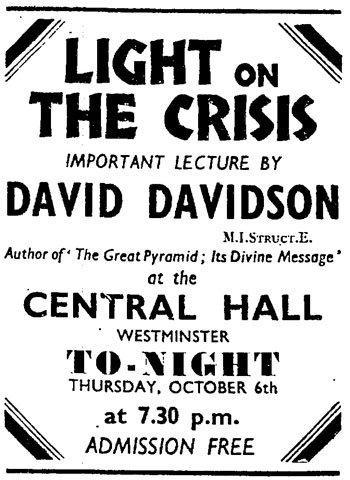
According to Wikipedia, David Davidson predicted successive dates for the end of the world based on measures of the Great Pyramid, starting with 1954. So that may shed some light on the 'Light on the crisis'.
![]() This work is licensed under a Creative Commons Attribution-NonCommercial-NoDerivatives 4.0 International License.
Permissions beyond the scope of this license may be available at http://airminded.org/copyright/.
This work is licensed under a Creative Commons Attribution-NonCommercial-NoDerivatives 4.0 International License.
Permissions beyond the scope of this license may be available at http://airminded.org/copyright/.

